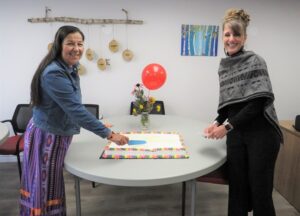New school Seven Stones Learning Centre opens

By Kelly Anne Smith
NORTH BAY— Elder and Anishinaabemowin speaker Richard Assinewai has given the name Niizhwaas Asiniik Skoonweh Kahn or Seven Stones Learning Centre to a new school in North Bay. The Grand Opening was held Sept. 23, with a crowd of approximately 40 people in attendance.
Seven Stones Learning Centre is located near the North Bay Indigenous Friendship Centre and the Friendship Centre’s Suswin Village.
Elder Assinewai teaches that Manitou gave Anishinaabe the four sacred elements.
“Land that we all share and are to look after. At anytime we are in need, we need to go the stone people for help, guidance, and healing. This is when we all gain our strength to do things in life. The seven stones represent the gifts that we are all born with, which are referred to as the Seven Grandfather Teachings.”
North Bay Indigenous Friendship Centre President Maurice Switzer says other alternative schools run by Friendship Centres have graduated hundreds of Indigenous students who struggled to thrive in provincial schools.
Executive Director Kathy Fortin says it’s essential for North Bay to have it because of the population of Indigenous People here.
“A lot of the northern communities send their children here to come to school. Some of them are as young as fourteen walking into an environment of a big building. Not having the proper navigation, I think is really intimidating to students. A lot of them don’t fit in with the big population. Having this school will be a more comfortable, culturally-appropriate environment for them.”
The Seven Stones Learning Centre is for students aged 18 and over. Initial registration is with Chippewa Secondary School and then with Seven Stones.
Fortin says the school will offer flexibility.
“They will be able to come in and get their assignment and meet with Natalie who has been hired as the coordinator of the school.”
Natalie Wiseman is the Indigenous Alternative Secondary School Education Coordinator overseeing Seven Stones Learning Centre. She says the students will be able to be culturally creative.
“There’ll be crafts. Things that they hold sacred. The sacred items that they may not necessarily have access to, making those items or obtaining them in the regular school. There could be medicine pouches, the ribbon skirts, quilting – like the star quilts we have made here. There’s many different little crafts that they would make.”
Wiseman says medicines and cultural foods would be available as well.
Fortin points to the Friendship Centre’s nutrition program.
“Nutrition is important in order to learn properly. Natalie will bring in people who can incorporate the traditional foods, when we have feasts or goose. A lot of the students that come from the north, they really miss that goose or that moose.”
The new school funding is through the Ontario Federation of Indigenous Friendship Centres (OFIFC). Fortin ensures there will be essential wrap-around services.
“Especially here at the Friendship Centre, they will be able to take part in any of the youth activities along with our many healing and wellness programs.”
She adds that the Suswin Village will be open soon and some of the residents will be able to take advantage of the school.
“The school board is the partner we have. We partner the OFIFC, the Friendship Centre, and the school board. The school board does the hiring of the teacher. They will hire a qualified teacher to hold that position. They will teach the curriculum of whatever’s mandated by the government.”
Fortin says the focus is on incorporating cultural components so the student feels connected and feeling a sense of belonging; land-based activities are being planned.
“We have 208 acres out on Riding Stable Road near Sturgeon Falls. The students will be able to do a land-based activity. We are working with the school board in regards to how that is going to look and how they can get credits for say, if they skin some beaver and fillet some fish or are tanning hides.”
Wiseman says time will be spent with each student to figure out what their needs are and how to best support them.
“We would be preparing them to either go back into mainstream school, if they are in that school and there were difficulties or challenges, or we would be educating them and having them move onto post-secondary school. Or we would be preparing them for the work force. So, successfully help them work their way through the education system.”
Land-based activity is going to be key, says Fortin. She noticed positive change when the health outreach coordinator would take the men out onto the land.
“Everyone felt freer out there. They were able to express themselves more out on the land. You know what it’s like when you go out onto the land and you feel free.”
Fortin says a lot of the students are from the bush up north and remote communities. She thinks the land-based education will be welcoming for them.
“They will have winter activities, too – snowshoeing, snaring. But also, they will be able to identify plants, medicinal plants, and be able to grow them. I think that’s a key point. They’ll learn there, too. How many leaves does it take to make a tea?” she adds. “The Friendship Centre is also receiving a program for language. I think that it’s important for these students to learn their language, whether it’d be Cree or Ojibwe. So that will be part of the curriculum, too… It will be welcoming, especially for the residents of Suswin Village. Some of them just need that independent learning. And it’s not going to be a big school. It’s going to be more one-on-one.”
The Seven Stones Learning Centre is now open and accepting applications to attend the school.


